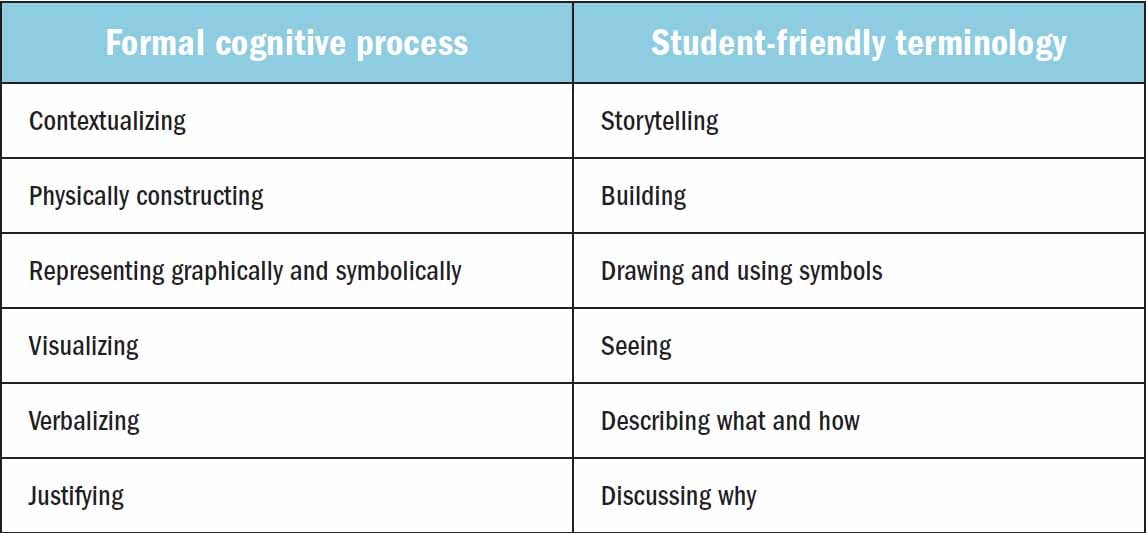
Adapted from Developing Numerical Fluency by Patsy Kanter and Steven Leinwand
Students do not develop numerical fluency by memorization and regurgitation of rules. Rather, numerical fluency develops over time as students engage in active thinking and doing. They must strategize, reason, justify, and record and report on their thinking. Accordingly, the effective development of numerical fluency involves the use of a set of cognitive processes throughout mathematics, not just in one lesson or introductory lessons.
When mathematics lessons are systematically planned and implemented with these six processes at the forefront, teachers maximize the chances of all students becoming numerically fluent.
These processes are not unique to numerical fluency—in fact, the same processes are essential for the development of spatial sense, algebraic reasoning, and other big ideas in mathematics!

- Contextualizing or Storytelling: Understanding that life can be described mathematically is at the foundation of fluency. Equations exist because they are a shortcut to explain situations, look at reality, and make predictions.
- Physically Constructing or Building: Children need to manipulate materials to develop an understanding of the action of operations, which is then extended to the visual or pictorial level and then to abstraction.
- Representing Graphically and Symbolically or Drawing and Using Symbols: Seeing and using models and relationships between models supports visual memory, building relationships, and mental fluency, and enhances long term memory.
- Visualizing or Seeing: Children learn to visualize quantities and the relationships between them. As children accumulate a visual repertoire, their numerical fluency grows because the are able to "see" the mathematics in which they are engaged.
- Verbalizing or Describing What and How: Understanding of operations is achieved when students describe and explain what they did with the materials that they manipulate and the pictures they draw. Students need to describe the representations they create and how various representations are similar and different.
- Justifying or Discussing Why: Discussing relationships and justifying solutions to problems is fundamental to developing metacognition and crucial to long-term fluency.
These six processes are the essence of the differentiation needed to effectively teach mathematics. One student might make sense of subtracting in a context, while another needs to tough and feel the comparison of two qualities, while a third learns best by "talking through."
Fluency emerges from diverse experiences that link numbers and operations to contexts and familiar situations, and that provide students throughout their mathematical development with opportunities to construct, visualize, verbalize, and justify.
•••
Learn more about Developing Numerical Fluency on Heinemann.com

Patsy Kanter is an author, teacher, and international math consultant. She worked as the Lower School Math Coordinator and Assistant Principal at Isidore Newman School in New Orleans, Louisiana, for 13 years. Patsy is the co-author of Every Day Counts: Calendar Math and a consulting author for Math in Focus.
Follow Patsy on Twitter @patsykanter
 Steve Leinwand is the author of the bestselling Heinemann title Accessible Mathematics: Ten Instructional Shifts That Raise Student Achievement.He is Principal Research Analyst at the American Institutes for Research in Washington, D.C., where he supports a range of mathematics education initiatives and research. Steve served as Mathematics Supervisor in the Connecticut Department of Education for twenty-two years and is a former president of the National Council of Supervisors of Mathematics.
Steve Leinwand is the author of the bestselling Heinemann title Accessible Mathematics: Ten Instructional Shifts That Raise Student Achievement.He is Principal Research Analyst at the American Institutes for Research in Washington, D.C., where he supports a range of mathematics education initiatives and research. Steve served as Mathematics Supervisor in the Connecticut Department of Education for twenty-two years and is a former president of the National Council of Supervisors of Mathematics.
Follow Steve on Twitter @steve_leinwand



